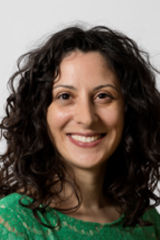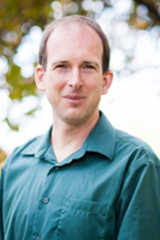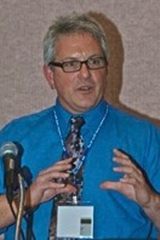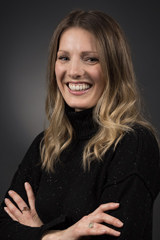On this page:
Argerie Tsimicalis
Kyle Eliott | Richard Hovey | Piotr Przytycki | Charlotte Usselman
Winner
 Argerie Tsimicalis, Ingram School of Nursing
Argerie Tsimicalis, Ingram School of Nursing
“I offer my students the knowledge, skills, and tools to run with their ideas, and to collectively dream, discover and innovate.”
Approach to graduate supervision
I take a student-centered approach to teaching regardless of class size while accounting for the evidence, context, time and resources. I seek to understand my learners and remain attuned to their needs, knowledge gaps and collective expectations. In turn, I learn my students’ hidden talents and seize opportunities to direct their learning, leverage resources, and advance their networks and careers. I strive to ignite a spark, which finds its expression in ongoing contacts and collaborations after students’ graduation; my course and supervisory effectiveness; number of student-led publications, presentations, and awards; and my dedication to creating and contributing to future research opportunities. I offer my students the knowledge, skills, and tools to run with their ideas, and to collectively dream, discover and innovate.
Testimonials
Dr. Tsimicalis was the Nurse Scientist who convinced me that the practice of nursing includes research; and that given my prior interests in digital health, I could be a leader in nursing informatics by continuing my research as a PhD student. And it turned out – she was right: I love research, and I’m exploring a project I had been thinking about for several years. She excels at individually inspiring each of her students by recognizing their strengths and sharing how they can improve as nurses and scholars. She has the brilliance, empathy, and drive to continue inspiring all her nursing students to lead in nursing research and practice. Her leadership approach is to bring out the best in her students, whether or not these approaches directly benefit her own research program. It continues to be a privilege to learn, laugh, and conduct innovative palliative mHealth research, with Dr. Tsimicalis as my primary supervisor.
Aimee Castro, MSc(A), RN, PhD Candidate,
Ingram School of Nursing, McGill University
Nominees
 Kyle Elliott, Natural Resource Sciences
Kyle Elliott, Natural Resource Sciences
“Learning how to find an answer is less important than learning how to ask the right question.”
Biography
My mentoring approach has been shaped by the many people, both formal and informal supervisors, that have guided me along my current path. I started out with a BSc at UBC in Math & Physics, but quickly realized I preferred living organisms. I then completed a BSc in Conservation Biology, with an Honours thesis supervised by Jamie Smith on raptor populations in the Fraser Delta, MSc (supervised by Gail Davoren) and PhD (supervised by Jim Hare and Gary Anderson) at the University of Manitoba on seabirds. Finally, I switched to fruit flies during a postdoc with Ryan Norris. I am particularly indebted to those people that challenged me to think theoretically and to see the big picture, when I was often caught up in the minutiae of my project.
Approach to graduate supervision
My teaching is aimed towards training student minds that will be entering the workforce during a period of transformation where the world has become data-rich. To address the needs of the 21st century student, my graduate teaching philosophy emphasizes how to obtain, critique and analyze the deluge of information now available on any subject imaginable. As the Internet can answer many questions at the tap of a finger, learning how to find an answer is less important than learning how to ask the right question. I mentor each student through a series of modules that examines the theory of science, allowing them to understand and critique the hypothetico-deductive approach, and therefore ask the right questions. I endeavor to challenge each student so that they become wide-thinking and broadly knowledgeable within science, and not just experts within their sub-field. I like to be aware of challenges and progress of students but appreciate that students need to be able to make their own decisions and mistakes to develop as independent scientists.
Testimonials
During my Master’s degree in movement ecology of Arctic shorebirds, I was already familiar with Kyle’s research and grew increasingly interested in his work. When looking for a PhD position, Kyle was the first potential supervisor I contacted, and highest on my list among the researchers I wanted to work with, both inside and outside Canada. Kyle is an excellent mentor; he gives his student the freedom they need to formulate their own research questions and follow their own ideas and intuition as young scientists, while giving them advice and support along the way. He was encouraging and welcoming and helped me navigate potential topics for a PhD thesis in his lab, giving me latitude to define my own research questions and include international collaborators that would benefit my project. With Kyle’s encouragement, I have been able to carry out successful fieldwork in two remote field sites (Svalbard and Alaska) and undertake internships in at the Norwegian Institute for Nature Research and the Centre d’Études Biologiques de Chizé. Carrying out these international activities during the pandemic is challenging and would not have been possible without the active support from Kyle, both emotional and financial.
Don-Jean Léandri-Breton, PhD Candidate,
Department of Natural Resource Sciences, McGill University
 Richard Hovey, Division of Oral Health and Society
Richard Hovey, Division of Oral Health and Society
“I endeavor through active and communitive learning to facilitate and enhance graduate student learning, so the expert is replaced with expertise as a shared experience.”
Biography
Richard B. Hovey, BEd, MA, PhD, is an associate professor with the Division of Oral Health and Society, Faculty of Dentistry, McGill University. My research utilizes philosophical hermeneutics and phenomenology to concentrate on bridging gaps among theories, philosophies and practices in healthcare, communities, and individuals. Topics of interest include chronic diseases / pain / Thalassaemia, support groups; patient and health professional education, communication, leadership, interdisciplinary team building / hermeneutic wager, Indigenous people’s health through Two-Eyed Seeing.
Approach to graduate supervision
My approach to graduate teaching is based on the interweaving of all the best attributes / practices of teachers I have learned from throughout my life. This coupled with adult learning theories such as transformational learning, I endeavor through active and communitive learning to facilitate and enhance graduate student learning. In this way, the expert is replaced with expertise as a shared experience, one in which everyone has an opportunity to participate, teach, learn while evolving into a researcher. A person and researcher who demonstrates humble confidence and ability to take what was learned into practice. This approach offers the student learning experiences other than being passive learners but rather as someone who rigorously understands their research methodology while being aware of their own voice, passion and commitment to their journey. My philosophy of teaching and research practice come inseparable as the student evolves reflectively and practically.
Testimonials
When I first met Prof. Hovey, I was a staff member at the Faculty of Dentistry. Over time and through conversation, I became so interested in his research that I enrolled to finish the missing credits of my bachelor’s degree just to apply to the faculty’s master’s program under his supervision. He has consistently encouraged me to publish and present my work. He has also supported me when I brought other opportunities to his attention and invited me to collaborate on publications. He understands when to encourage and when to offer space. He is attuned to the well-being of his students, and always respects our decision when we chose not to pursue a particular opportunity. Prof. Hovey has given me the tools I need to develop my research, leadership, and reflective skills to succeed on my academic path. I would not be where or who I am without him.
Marie Vigouroux, MSc Dentistry, PhD Student, RA,
Department of Integrated Studies in Education, McGill University
 Piotr Przytycki, Mathematics and Statistics
Piotr Przytycki, Mathematics and Statistics
“I act as a sparring partner for students' ideas, motivating them and keeping them on the right track towards the solution.”
Biography
I come from a family of mathematicians. My mother, Jolanta Słomińska, is an algebraic topologist, and my father, Feliks Przytycki, does dynamical systems. My husband, Marcin Sabok, is also a mathematician, a logician. My research interests are geometric group theory and low-dimensional topology. I received my PhD at the Polish Academy of Sciences in 2008 under the supervision of Jacek Świątkowski in Wrocław. I stayed at the Academy until I joined the faculty at McGill University in 2014. I also spent a year at the University of Illinois at Urbana-Champaign in 2011 and at Paris Sud Orsay in 2013–2014. My great passion is theatre. In particular, in 2010 I directed David Auburn's Proof in amateur theatre "Kontrapunkt" in Warsaw, created and directed by professional actor and director Zbigniew Bogdański.
Approach to graduate supervision
I choose a particular problem at the beginning of the supervision period, and make sure it fits student's taste and talent. Mostly I act as a sparring partner for their ideas, motivating them and keeping them on the right track towards the solution. I make sure that they have solved the problem in advance before the submission to have time to write down the paper. Then I read and reread to teach them how to write. Thus far it always resulted in a publishable paper, a trampoline for their future academic career.
Testimonials
Prof. Piotr Przytycki has had a profound impact on the way that I approach mathematics. I have learned that no approach is too outdated, no theory too esoteric, no computation too pedestrian. Piotr sees elegance in transparency and simplicity, but also in the application of the correct tool at the correct moment. He has never made me feel like a suggestion of mine was outlandish or irrelevant, or dismissed any of my questions, even if they were not immediately pertinent to the problem at hand or took him outside his fields of expertise. Piotr’s mentorship goes beyond the purely mathematical; he is very generous with his advice on navigating even the most mundane aspects of our discipline.
Sami Douba, PhD Student,
Department of Mathematics and Statistics, McGill University
Prof Przytycki was my advisor during my master's studies at the University of Warsaw, Poland, and my co-advisor during my doctoral studies at McGill University. I feel extremely lucky to have been advised by Prof Przytycki and have no doubts about his enormous role in my success in graduate school. As an excellent teacher, he is very thorough in designing courses that motivate students to learn a lot. He has always been very generous with his time and constructive feedback. He successfully creates an inclusive environment in the classroom and in his research group, where students of diverse identities belong. In my moments of doubt, Prof Przytycki offered enormous amounts of support and encouragement. He always believed in me, which helped me stay motivated and overcome challenges.
Kasia Jankiewicz, L.E. Dickson Instructor (postdoctoral),
University of Chicago
 Charlotte Usselman, Kinesiology and Physical Education
Charlotte Usselman, Kinesiology and Physical Education
“I prioritize developing relationships with my students so that I can help them to grow in the areas most important to them.”
Biography
My research aims to understand how the vascular and nervous systems (jointly, the “neurovascular” system) interact with gonadal hormones to determine cardiovascular health in women. I became interested in this area during my grad studies at Western University where I studied neurovascular regulation across the menstrual cycle. However, I then learned that very few labs were studying these interactions in humans! To establish the expertise that I was looking for, I completed postdocs in neurovascular function in pregnancy (University of Alberta) and in vascular function in women with polycystic ovary syndrome (Yale University) before beginning at McGill in January 2018.
Approach to graduate supervision
I have developed team-building strategies with roots in principles of sports psychology. I aim to provide my team with core technical skills and to aid in the development of personal and inter-personal attributes which allow them to perform to the best of their abilities. At the same time, I lean heavily on my senior students to help foster the team environment; my students help each other with technical skills like editing each other's written work and piloting new techniques in the lab, while also supporting each other through the challenging aspects of grad school and celebrating each other's accomplishments. I also acknowledge that my students are not equally invested in the traditional goals of academia, and thus require individualized approaches to keep them motivated. Moreover, each student is unique with their own personalities and strengths and limitations. To that end, I prioritize developing relationships with my students so that I can understand each student's perspective and help them to grow in the areas most important to them.
Testimonials
Charlotte is a radiant person who brightens up the entire department of Kinesiology and Physical Education. She is always an energetic, positive mentor who makes everyone around her feel important and cared for. After only a few short weeks working with Dr. Usselman, I quickly identified her as a positive role-model, and she played a huge role in my decision to pursue a PhD and hopefully continue in research after my time in her lab. I am so grateful for her endless support and because of her, I have grown into a confident researcher who is not afraid to chase after my academic and personal goals. Dr. Usselman is a kind, caring person who makes our lab a positive place to work in and thrives in her role as the PI. Her attributes are without a doubt going to transform this lab into a world-class research hub and it is truly amazing to watch this unfold.
Yasmine Coovadia, MSc, PhD Candidate,
Cardiovascular Health and Autonomic Regulation Laboratory, McGill University
Dr. Charlotte Usselman is a brilliant scientist that leads by example. Her inquisitiveness and passion for physiology are infectious and it has been the greatest privilege of my life to be able to learn from her. Due to her innovation, extensive theoretical expertise and practical skills, I am now pursuing a PhD in her research-driven laboratory, an ambition I never knew I wanted until I meet Charlotte. She has built a collaborative laboratory, in which teamwork is nurtured and students support one another like a family. Through weekly meetings, constant communication, and an open-door policy, she has created an environment where each student is made to feel like a priority.She works tremendously hard to make sure each one of her students are able to achieve their goals, and that is due to her innate resilient mindset. Dr. Usselman has been the most influential role model I could ask for, and my first ever science hero. To say she has impacted my life in an understatement. I continue to be inspired by her ability to be passionate, determined, and driven in a demanding research industry and I hope that one day I can be half the researcher and woman that she is.
Danielle Berbier, PhD Student,
Cardiovascular Health and Autonomic Regulation Laboratory, McGill University
 This work is licensed under a
This work is licensed under a 